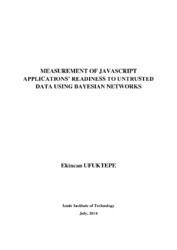Please use this identifier to cite or link to this item:
https://hdl.handle.net/11147/4249Full metadata record
| DC Field | Value | Language |
|---|---|---|
| dc.contributor.advisor | Tuğlular, Tuğkan | - |
| dc.contributor.author | Ufuktepe, Ekincan | - |
| dc.date.accessioned | 2014-12-05T14:32:42Z | - |
| dc.date.available | 2014-12-05T14:32:42Z | - |
| dc.date.issued | 2014-07 | - |
| dc.identifier.uri | http://hdl.handle.net/11147/4249 | - |
| dc.description | Thesis (Master)--Izmir Institute of Technology, Computer Engineering, Izmir, 2014 | en_US |
| dc.description | Includes bibliographical references (leaves: 52-54) | en_US |
| dc.description | Text in English; Abstract: Turkish and English | en_US |
| dc.description | Full text release delayed at author's request until 2017.08.28 | en_US |
| dc.description.abstract | Web applications have become an integral part of our daily lives. People mostly provide their important needs, such as people keep their private data, do their banking transactions, shopping etc. through web applications. Therefore, web applications have been an attractive target to malicious individuals and organizations. The usage of JavaScript language by web application developers is increasing very fast, especially after JavaScript started to service back-end developers as well. Therefore, JavaScript has incorporated both front-end and back-end developers. Concurrently, due to flexibility and its most popular library called jQuery, JavaScript has become an attractive to web application developers. OWASP updates the top 25 security vulnerabilities regularly. According the results, SQL Injection (CWE-89) and Operating System Command Injection (CWE-78) has taken the 1st place and Cross-Site Scripting (XSS) (CWE-79) has taken the 3rd place. The results shows that three input validation based vulnerabilities appear in the top three; therefore, it can be said that input validation vulnerabilities have become critical vulnerabilities of web applications. However, developers still fail to validate the inputs or use libraries to protect their web applications against input validation vulnerabilities. In this thesis, JavaScript application’s functions are analyzed to determine if their parameters are validated or not. Then, according to the invalidated inputs, a Bayesian Network to measure its readiness to input validation vulnerabilities is generated. | en_US |
| dc.language.iso | en | en_US |
| dc.publisher | Izmir Institute of Technology | en_US |
| dc.rights | info:eu-repo/semantics/openAccess | en_US |
| dc.subject | Bayesian Networks | en_US |
| dc.subject | Input validation vulnerabilities | en_US |
| dc.subject | Measurement of readiness | en_US |
| dc.subject.lcsh | JavaScript (Computer program language) | en_US |
| dc.title | Measurement of Javascript Applications' Readiness To Untrusted Data Using Bayesian Networks | en_US |
| dc.title.alternative | Javascrit Uygulamalarında Güvenilir Olmayan Verilere Karşı Hazırlığının Bayesian Ağları ile Ölçülmesi | en_US |
| dc.type | Master Thesis | en_US |
| dc.authorid | 0000-0002-0156-4321 | - |
| dc.institutionauthor | Ufuktepe, Ekincan | - |
| dc.department | Thesis (Master)--İzmir Institute of Technology, Computer Engineering | en_US |
| dc.relation.publicationcategory | Tez | en_US |
| dc.identifier.wosquality | N/A | - |
| dc.identifier.scopusquality | N/A | - |
| item.languageiso639-1 | en | - |
| item.grantfulltext | open | - |
| item.fulltext | With Fulltext | - |
| item.openairecristype | http://purl.org/coar/resource_type/c_18cf | - |
| item.openairetype | Master Thesis | - |
| item.cerifentitytype | Publications | - |
| crisitem.author.dept | 03.04. Department of Computer Engineering | - |
| Appears in Collections: | Master Degree / Yüksek Lisans Tezleri | |
Files in This Item:
| File | Description | Size | Format | |
|---|---|---|---|---|
| 10029074.pdf | MasterThesis | 2.36 MB | Adobe PDF |  View/Open |
CORE Recommender
Page view(s)
358
checked on Jun 16, 2025
Download(s)
162
checked on Jun 16, 2025
Google ScholarTM
Check
Items in GCRIS Repository are protected by copyright, with all rights reserved, unless otherwise indicated.